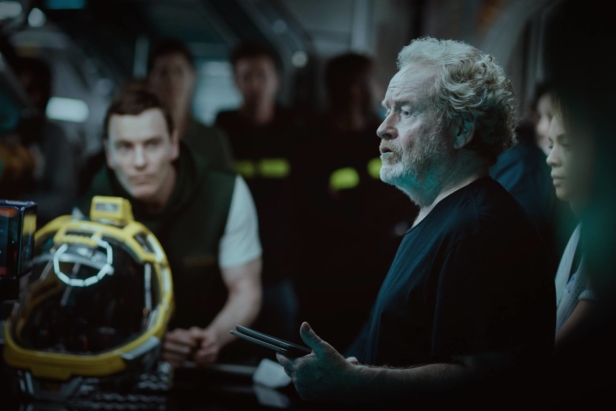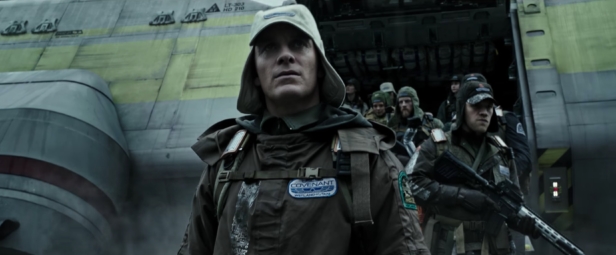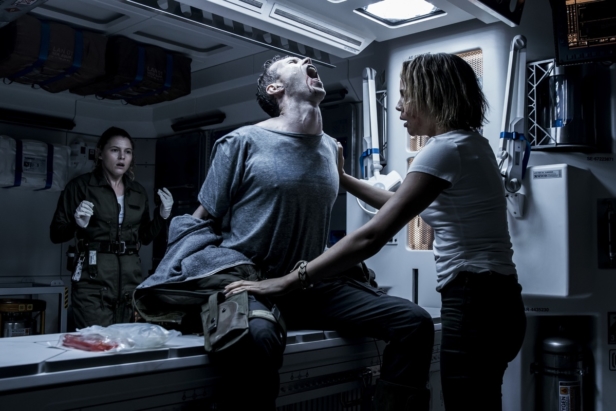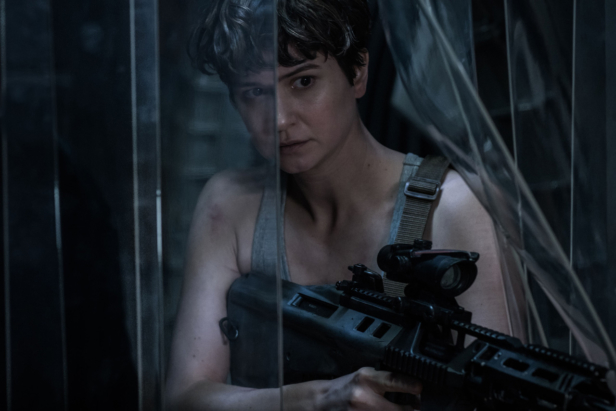Alien: Covenant is playing now in UK cinemas but when we talk to Ridley Scott about the latest chapter in the franchise he created, the film is about a month away from release. Segments have played at various conventions and festivals, the promotional machine had really ramped up, and he catches himself about to drop a huge spoiler at one point (“I probably shouldn’t tell you that, should I?”), and what is very clear is just how excited he is for audiences to see it.
“I can’t wait, actually,” he enthuses. “There’s some great stuff. I think what’s good is not only is there some good scary stuff, but there’s also some very clever thinking that occurs within the context of the story and the characters.”
This is your third time now, do you ever get used to the process of making an Alien film?
No, I mean I did one and then three followed and then we thought that was the end of it. Then they actually did Alien Vs Predator, which was probably financially a very good idea but I thought it was a very bad idea for the good old beast. And I’d always thought about, and not one of the sequels ever asked: why would you design such a thing, and to what purpose, to what end, right?
So that seemed to be an obvious question and so we got together at Fox and I said “I think we can come up with a story that fundamentally gets to the question, which also inevitably will lead us down the vaguely highbrow path of creation, God and this and that.” That’s what it was. From ground zero we went and did Prometheus, which frankly did pretty well, so well that it justified yet another one. And also what was interesting was it left us with a lot of questions, so this one deals with answers.
So you were already planning Covenant while working on Prometheus?
Oh, definitely. That’s why we left [David] alive at the end. He was in two parts but we left [David and Shaw] together at the end because I thought “One way or another, we’ll be doing the next one.” Prometheus was five years ago, so what’s happening now is that I’m already having written the second part of Covenant because we don’t want to wait so long this time.
Both this and Prometheus had different writers at different stages. What was the process here?
Every script, unless it’s based on a play or a book or something like that, particularly when they are ground zero stories, what tends to happen is I usually have some kind of idea of what it could be. The broad stroke is this and that, you could almost put down the idea in a paragraph. “This is where we’re going with this. And we’re going to address who invented this and for what reason, and perpetuate the idea of, if you like, gardeners of space. Evolution.” So then on this one, overall there were a couple of writers but John Logan eventually put it to bed. John came in and did a lot of work on the shooting script.
Is it fun to start with such a hopeful beginning, characters searching for a new home, before the horror kicks in?
It’s a hopeful beginning, yeah, in that, a bit like our pilgrim fathers, they’re going off into space to essentially reform into a place that they have scientifically studied and connected with and registered with. So, unlike Mars. If you get to Mars you’re not going to be able to live there. We also know that there are many places that are pretty well at the level Earth is in terms of: do they have oxygen, yes, do they have all the attributes that are required for a life form, of course they do.
Now NASA has decided there are thousands, millions of them, so it’s a matter of deciding how to get there within an amount of time provided you invented a successful induced coma, which is called hypersleep. It’s a lot more difficult than we think, but we have to when we do science fiction things, you’ve got to start to assume certain things otherwise you’ll never get off ground zero.
How important is it to you to work with practical sets and effects?
Well, the idea of sets against green screen is a budgetary thing because everyone thought “Oh, green screen is it and this is going to be the end of the studios.” Well, that turned out to be total horseshit because if you can and you’re doing it efficiently, you should try and build as much as makes sense to help the actors.
For actors trying to act, watching a monster coming at them or whatever, looking at a green screen is tough. But if you give them something to connect with which is well done, and which we can then connect with digitally and reproduce it or tile it, then it honestly works out cheaper. It’s quicker and cheaper, if you know what you’re doing. If you don’t know what you’re doing then you’re going to go way over budget.
The set design on the first film has been so incredibly influential.
I think Alien was a good look and a terrific set, a concept of what life might be like on board. Because Star Wars was a bit more fantasy. I always look on Star Wars as the fairy story of space on film, which I think is genius, the first one was seminal. And then Alien I think did the rougher edged version of reality in space, and I think Stanley Kubrick set us all off with 2001 by doing a perfectly good look at what NASA might have to get up to do these massive journeys and distances. Right there are the three films that I think pretty well established where we are right now.
There’s a really interesting cast in Covenant, a great mix of actors…
Well, I always like to mix it. In this instance of course, why would you change from female to male, I think we’ve had a good run with Sigourney Weaver, so it seemed to make sense to go again with Katherine Waterston. I look at lot of stuff, I’d seen a film that Katherine had done with Joaquin Phoenix, Inherent Vice, and I was very impressed with her.
I’d never worked with Billy Crudup, and I’d admired Billy for many years and never really found anything specific for him to do which made sense for both us. So I met Billy and he said “Let’s do it,” and we cast that way. And of course I already had Michael Fassbender.
How difficult is the process of designing new monsters?
Murder. It’s the hardest thing to do. I always say this and comedians will get furious, but I think it’s easier to make people laugh than to really, really scare the shit out of people. Therefore designing a monster is very difficult without doing another dinosaur or something. Nothing wrong with dinosaurs, dinosaurs should stay with dinosaur movies, you can’t do monsters that look like dinosaurs. And god bless Godzilla and King Kong, you know, it’s all part of the business, but to do a different, unique alien..it’s very rare.
I think the reason why the first Alien hung in so well immediately was because it was so unique and so different. And one would put that entirely at the feet of HR Giger, I spotted it and insisted on it. There were variations of things that he had to design, which were the egg, the chestburster and the facehugger.
Funnily enough he didn’t design the chestburster, that was designed by somebody else because he couldn’t quite crack that one. It kept looking like a plucked turkey, and I said “Listen, you’ve got enough to do doing all that.” He hung in there and did everything else and gave us great models for the planet and everything, whilst our other production designer Michael Seymour and his art directors Leslie Dilley and Roger Christian put together the Nostromo.
So we kept two design teams very separate. One purely looked after the alien planet which was fundamentally HR Giger working with Les Dilley who could put it together. I mean, to do a drawing of the chair of what we eventually fondly called the space jockey is one thing, but then to build it and not have it look like Disneyland is really tough. Les Dilley did a fantastic job on what Giger gave him to reproduce on a big scale. So I always take my hat off to Les as much as anyone else.
And you’re bringing back the xenomorph this time…
Oh, this is way beyond that now. I realised in Prometheus they really do miss the big guy! The alien, they do miss the death stuff and they do miss things like that and so without any question, we’ve reintroduced him in a very organic and clever way. But there are others as well that come to visit.
The original title was Alien: Paradise Lost. Are those Miltonian themes still important to the script?
Yeah, the idea that at one time there was a place that could easily be described as Paradise because it was perfect in every way, but of course there’s no such thing as Paradise, there’s always the good and the bad and the dark and the light.
As you have in the two characters in Paradise Lost, the bad guy is always more handsome, gets the girls and goes to nightclubs and shit. The other guy is kind of hardworking, kind of a bit boring and actually gets to go to no nightclubs and doesn’t get the girls. If you’re a bad guy, you have more fun. So it addresses that certainly.
Is it the chance to address these themes that keeps you excited about the Alien universe?
Well, I think it goes deeper, because the question of creation is on everyone’s mind really. The question of god or not god, I don’t care who you are, one thinks about that. If it’s a not a god but a species that simply enabled us to be who we are. Otherwise we end being considered to be biological accidents over the billion years we’ve taken to evolve, whatever that is, and by the way the heartbeat of 70,000 years that we’ve been on this planet is a blink of an eye.
So the question of who and why and which process triggered us off, I don’t think it was by accident, I think it was by design. But was it a guy who looked like Moses with a staff and stuff like that? I think it may have been by a species. So I’m one of those, right? Following the logic of it, not the fantasy, the logic seems to go in that direction.
Alien: Covenant is in cinemas now. Read our set visit feature in the new issue of SciFiNow, our interview with Katherine Waterston here, and our review here.




